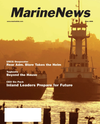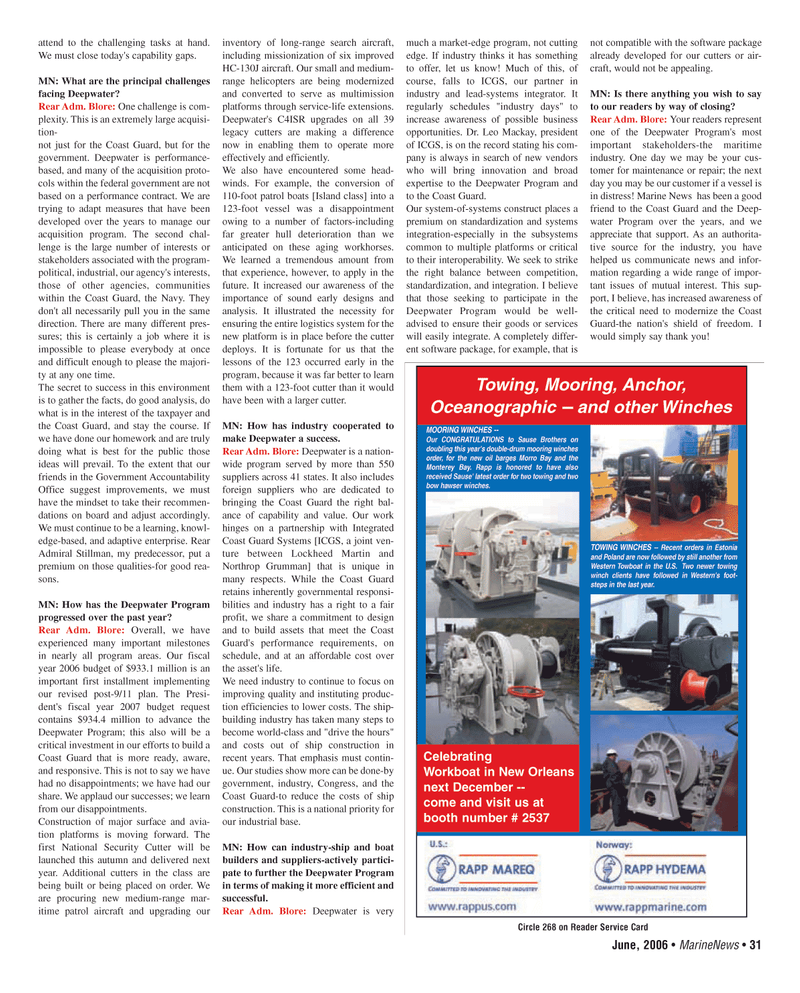
Page 31: of Marine News Magazine (June 2006)
Fourth Annual "Geo Six Pack"
Read this page in Pdf, Flash or Html5 edition of June 2006 Marine News Magazine
June, 2006 • MarineNews 31 attend to the challenging tasks at hand.
We must close today's capability gaps.
MN: What are the principal challenges facing Deepwater?
Rear Adm. Blore: One challenge is com- plexity. This is an extremely large acquisi- tion- not just for the Coast Guard, but for the government. Deepwater is performance- based, and many of the acquisition proto- cols within the federal government are not based on a performance contract. We are trying to adapt measures that have been developed over the years to manage our acquisition program. The second chal- lenge is the large number of interests or stakeholders associated with the program- political, industrial, our agency's interests, those of other agencies, communities within the Coast Guard, the Navy. They don't all necessarily pull you in the same direction. There are many different pres- sures; this is certainly a job where it is impossible to please everybody at once and difficult enough to please the majori- ty at any one time.
The secret to success in this environment is to gather the facts, do good analysis, do what is in the interest of the taxpayer and the Coast Guard, and stay the course. If we have done our homework and are truly doing what is best for the public those ideas will prevail. To the extent that our friends in the Government Accountability
Office suggest improvements, we must have the mindset to take their recommen- dations on board and adjust accordingly.
We must continue to be a learning, knowl- edge-based, and adaptive enterprise. Rear
Admiral Stillman, my predecessor, put a premium on those qualities-for good rea- sons.
MN: How has the Deepwater Program progressed over the past year?
Rear Adm. Blore: Overall, we have experienced many important milestones in nearly all program areas. Our fiscal year 2006 budget of $933.1 million is an important first installment implementing our revised post-9/11 plan. The Presi- dent's fiscal year 2007 budget request contains $934.4 million to advance the
Deepwater Program; this also will be a critical investment in our efforts to build a
Coast Guard that is more ready, aware, and responsive. This is not to say we have had no disappointments; we have had our share. We applaud our successes; we learn from our disappointments.
Construction of major surface and avia- tion platforms is moving forward. The first National Security Cutter will be launched this autumn and delivered next year. Additional cutters in the class are being built or being placed on order. We are procuring new medium-range mar- itime patrol aircraft and upgrading our inventory of long-range search aircraft, including missionization of six improved
HC-130J aircraft. Our small and medium- range helicopters are being modernized and converted to serve as multimission platforms through service-life extensions.
Deepwater's C4ISR upgrades on all 39 legacy cutters are making a difference now in enabling them to operate more effectively and efficiently.
We also have encountered some head- winds. For example, the conversion of 110-foot patrol boats [Island class] into a 123-foot vessel was a disappointment owing to a number of factors-including far greater hull deterioration than we anticipated on these aging workhorses.
We learned a tremendous amount from that experience, however, to apply in the future. It increased our awareness of the importance of sound early designs and analysis. It illustrated the necessity for ensuring the entire logistics system for the new platform is in place before the cutter deploys. It is fortunate for us that the lessons of the 123 occurred early in the program, because it was far better to learn them with a 123-foot cutter than it would have been with a larger cutter.
MN: How has industry cooperated to make Deepwater a success.
Rear Adm. Blore: Deepwater is a nation- wide program served by more than 550 suppliers across 41 states. It also includes foreign suppliers who are dedicated to bringing the Coast Guard the right bal- ance of capability and value. Our work hinges on a partnership with Integrated
Coast Guard Systems [ICGS, a joint ven- ture between Lockheed Martin and
Northrop Grumman] that is unique in many respects. While the Coast Guard retains inherently governmental responsi- bilities and industry has a right to a fair profit, we share a commitment to design and to build assets that meet the Coast
Guard's performance requirements, on schedule, and at an affordable cost over the asset's life.
We need industry to continue to focus on improving quality and instituting produc- tion efficiencies to lower costs. The ship- building industry has taken many steps to become world-class and "drive the hours" and costs out of ship construction in recent years. That emphasis must contin- ue. Our studies show more can be done-by government, industry, Congress, and the
Coast Guard-to reduce the costs of ship construction. This is a national priority for our industrial base.
MN: How can industry-ship and boat builders and suppliers-actively partici- pate to further the Deepwater Program in terms of making it more efficient and successful.
Rear Adm. Blore: Deepwater is very much a market-edge program, not cutting edge. If industry thinks it has something to offer, let us know! Much of this, of course, falls to ICGS, our partner in industry and lead-systems integrator. It regularly schedules "industry days" to increase awareness of possible business opportunities. Dr. Leo Mackay, president of ICGS, is on the record stating his com- pany is always in search of new vendors who will bring innovation and broad expertise to the Deepwater Program and to the Coast Guard.
Our system-of-systems construct places a premium on standardization and systems integration-especially in the subsystems common to multiple platforms or critical to their interoperability. We seek to strike the right balance between competition, standardization, and integration. I believe that those seeking to participate in the
Deepwater Program would be well- advised to ensure their goods or services will easily integrate. A completely differ- ent software package, for example, that is not compatible with the software package already developed for our cutters or air- craft, would not be appealing.
MN: Is there anything you wish to say to our readers by way of closing?
Rear Adm. Blore: Your readers represent one of the Deepwater Program's most important stakeholders-the maritime industry. One day we may be your cus- tomer for maintenance or repair; the next day you may be our customer if a vessel is in distress! Marine News has been a good friend to the Coast Guard and the Deep- water Program over the years, and we appreciate that support. As an authorita- tive source for the industry, you have helped us communicate news and infor- mation regarding a wide range of impor- tant issues of mutual interest. This sup- port, I believe, has increased awareness of the critical need to modernize the Coast
Guard-the nation's shield of freedom. I would simply say thank you!
MOORING WINCHES --
Our CONGRATULATIONS to Sause Brothers on doubling this year's double-drum mooring winches order, for the new oil barges Morro Bay and the
Monterey Bay. Rapp is honored to have also received Sause' latest order for two towing and two bow hawser winches.
TOWING WINCHES -- Recent orders in Estonia and Poland are now followed by still another from
Western Towboat in the U.S. Two newer towing winch clients have followed in Western's foot- steps in the last year.
Towing, Mooring, Anchor,
Oceanographic and other Winches
Celebrating
Workboat in New Orleans next December -- come and visit us at booth number # 2537
Circle 268 on Reader Service Card
JUNE MN2006 4(25-32).qxd 6/2/2006 2:59 PM Page 31

 30
30

 32
32
